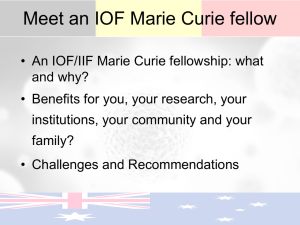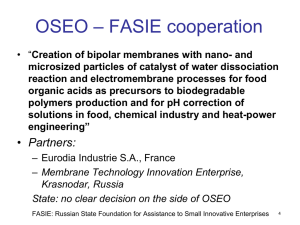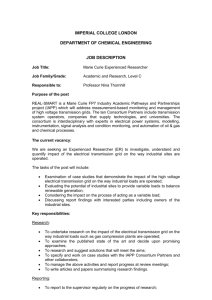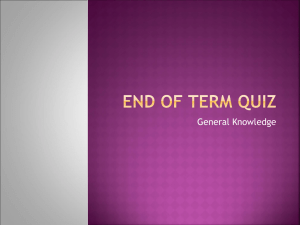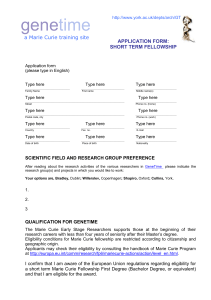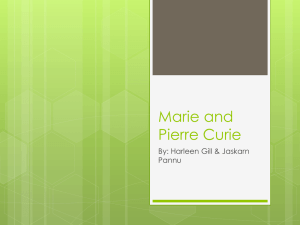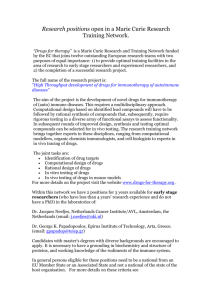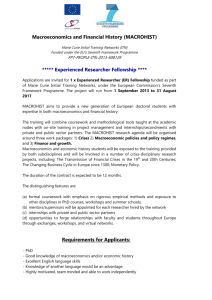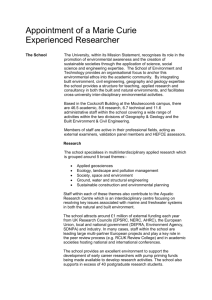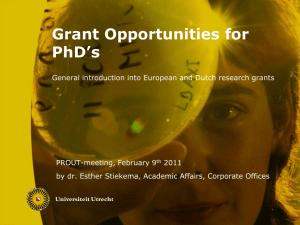What are the Marie Curie Actions? - National University of Ireland
advertisement
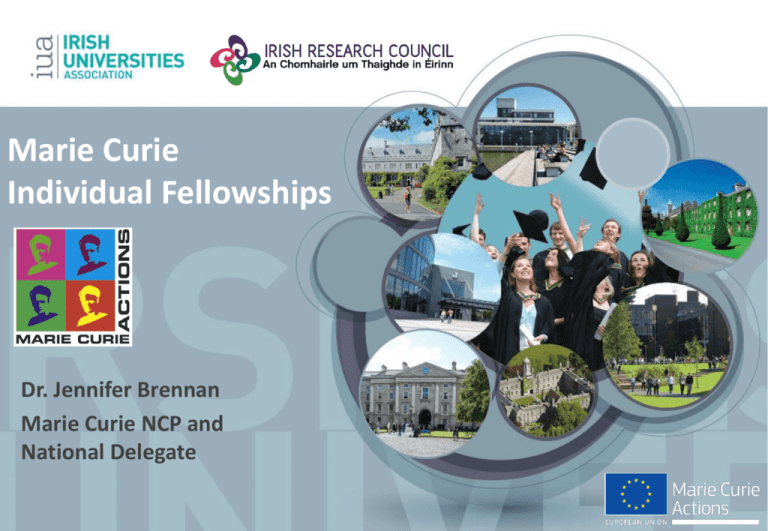
Marie Curie Individual Fellowships Dr. Jennifer Brennan Marie Curie NCP and National Delegate Marie Curie Actions = People Programme 9% of FP7 Budget is for Marie Curie Actions: €0.98 billion allocated for 2013 Calls - €240 million left to spend FINAL CALLS OF FP7 Marie Curie Actions, an Irish Success Story €438 million • Ireland’s “Take” from FP7 to-date €66 million • Portion of this secured via Marie Curie (2nd-Largest FP7 Income-Stream) €16 million • MC Co-funding secured to boost national R&D budgets 269 55 800 Data as of September 2012 • Irish Marie Curie Actions funded • Irish Participants in Marie Curie IAPPs • Research Posts created in Academia and Industry by MC Funding What are the Marie Curie Actions? • Intellectual Capital • Enter the Researcher Profession • Stay in Europe • Attracting international researchers Training Career Marie Curie Actions • Knowledge Transfer Mobility • International & InterSectoral Cooperation “Bottom-Up” • • • • • • • • • • Chemistry Physics Mathematics Life Sciences Economic Sciences ICT and Engineering Social Sciences & Humanities Earth & Environmental Sciences Applications are assessed in these 8 Panels Call success is equalised across the Panels Marie Curie Individual Fellowships IEF Intra-European “Researcher moving Fellowships for from Europe* to Career NUIG” Development 18% success rate (2011) IOF International Outgoing Fellowships “Researcher moving from NUIG to outside Europe, and back again” 19% success rate (2011) IIF International Incoming Fellowships “Researcher moving from outside Europe to NUIG” 14% success rate (2011) • IEF and IOF are about Career Development • IIF is about Transfer of Knowledge * The Member States and Associated countries (e.g. Switzerland, Israel, Norway) What does the EU funding cover? “Full-cost” fellowships • Living Allowance (salary) • Mobility Allowance (salary) • Research/Training Costs • Overheads Contribution • Total: €86,000 or €115,000 p.a., depending on researcher’s level of experience • Pre-tax salary ~€57,000 or ~€85,000 p.a. Facts and Figures Next Deadline: 14th August 2013 IEF: 134 M€ IIF: 44.5 M€ IOF: 44.5 M€ Project Duration IEF: up to 24 months IIF: 24 to 36 months IOF: 24 to 36 months* Budget ~€100k p.a. * Includes a mandatory 12-month reintegration 2012 Call Stats – all Europe Fellowship Type IEF IIF IOF Average cut-off score (differs for each panel) 89.4 90.4 91.1 # applications evaluated 3734 1462 962 #of fellowships funded ~600 ~190 ~150 Irish Performance - 2012 Call A - FUNDED 13.9% Evaluated 14 13.8% 8 15.4% 11.8% 58 4 2 17 IEF 101 IIF 26 IOF IxF Panel Performance (IE) - 2012 Call 30 8% IxF Funded 2 IxF Evaluated 25 17% 20 3 6% 1 8% 15 20% 1 26 2 10 18 16 5 0 CAR Career Restart Panel CHE Chemistry ECO Economic Sciences ENG ICT and Engineering ENV Earth & Environmental Sciences LIF Life Sciences MAT Mathematics PHY Physics SOC Social Sciences & Humanities 100% 10 2 0 2 0 CAR CHE ECO IEF: 710 SOC proposals 13 0 Irish proposals ranked #3 and #5 in all Europe 0 5 0 ENG ENV LIF MAT PHY SOC HEI Performance - 2012 Call 40 9% 35 3 IxF Funded IxF Evaluated 30 25 17% 20 3 15 10 7% 23% 1 3 40% 0 14 5 0 8 0 1 0 1 0 1 18 13 2 5 34 0 1 25% 100% 1 1 1 4 NUIG Performance - 2012 Call Fellowship Type # Evaluated # Funded Success Rate Intra-European (IEF) 10 1 10% International Incoming (IIF) 2 0 0% International Outgoing (IOF) 2 0 0% ALL (IxF) 14 1 7% How to apply for a Fellowship Eligible Researcher applies with Eligible Host Organisation(s) Application is prepared jointly by the Researcher and the “Scientist-in-Charge” (person in the host organisation that the researcher will work with if funded) Who is an eligible researcher? Age Limit • None Required Experience • Experienced Researcher: PhD or 4 years’ full-time equivalent research experience (after obtaining a degree permitting the researcher to begin studying for a doctorate) • Also open to More Experienced Researchers (with > 10 years experience after the degree permitting doctoral studies) Mobility Rule • At the Call deadline, the applicant must not have resided or had their main activity in the country of the host organisation for > 12 months in the last 3 years • Can apply with current host organisation as long as Mobility Rule is satisfied Intra-European Fellowships Nationality • No nationality requirements Mobility • Researchers must move from one Member State or Associated Country (MS/AC) to another • Mobility Rule applies Project Duration • 12 to 24 months Dr. Elena Martines Marie Curie Intra-European Fellow • • • • A native of Sicily PhD from University of Glasgow, 2005 Studied and worked in France, Sweden, Spain and Italy Moved to UCD in 2009, then successfully applied for a Marie Curie Intra-European Fellowship in 2010 IEF: Career Restart Option Conditions • Applicant must not have been active in research for at least 12 months immediately prior to the Call deadline. • Evaluated in a separate Career Restart Panel (CAR) Mobility • Mobility Rule is relaxed: At the Call deadline, the applicant must not have resided or had their main activity in the country of the host organisation for > 3 years in the last 5 years Project Duration • 12 to 24 months International Incoming Fellowships Nationality • No nationality requirements Mobility • Researchers must move from outside Europe (Other Third Country or OTC) to a MS/AC • Mobility Rule applies Project Duration • 12 to 24 months • Can add an extra 12 months reintegration to an International Cooperation Partner Country e.g. Brazil, South Africa, Armenia, Cuba,…………… Prof. Gary Stutte Marie Curie International Incoming Fellow • • • PhD in Plant Physiology from University of California-Davis Faculty Member at University of Maryland Moved to Kennedy Space Centre in 1992 to work on NASA Life Science Support Contract • • • • PI on plant research projects Conducted spaceflight experiments on-board Space Shuttle and International Space Station Started a collaboration with LIT in 2002 Moved to LIT on Marie Curie IIF awarded in 2010 International Outgoing Fellowships Eligible Researcher applies with Eligible Host Organisation in a MS/AC (e.g. Ireland) Eligible Host Organisation in an Other Third Country (e.g. Japan) • Employed by the Irish organisation for the fellowship duration • Seconded to the Japanese organisation for the “outgoing phase” (between 12 and 24 months) • Return to the Irish organisation for a mandatory 12-month “return phase” • If application is funded, the two organisations sign a Partnership Agreement International Outgoing Fellowships Nationality • Must be nationals of a Member State/Associated Country OR • Nationals from an OTC (Other Third Country) who have been active in a MS/AC for at least 5 years before the Call deadline Mobility • Researchers must move from a MS/AC to a country outside Europe (Other Third Country , OTC) • Mobility Rule applies Project Duration • 12 to 24 months outgoing phase in an OTC • Plus a mandatory 12-month return phase to a MS/AC Dr. Gillian Hendy Marie Curie International Outgoing Fellow • PhD in Electrochemistry from NUIM • • • • • • Project Engineer Analog Devices Awarded Marie Curie IOF in 2010 2 years in MIT working with Robert Langer • • IRCSET Scholarship Pat Hume Fellowship Endeavor Fellowship to research in Australia Forbes Magazine top 25 most influential people in the world in biotechnology Returning to NUIM for reintegration year What’s in the proposal? Proposal Content B1 • Research and Technological Quality (8 pages) B2 • IEF and IOF: Training (2 pages) • IIF: Transfer of Knowledge B3 • Researcher (7 pages) • Including CV and list of achievements B4 •Implementation (6 pages) B5 • Impact (4 pages) B6 • Ethics Issues (No page limit) Evaluation Criteria Criterion Threshold (Marks out of 5) Weighting Priority (ex-aequo) 4 25 1 3 (IEF and IOF) n/a (IIF) 15 2 3 25 3 Impact 3.5 20 4 Implementation* n/a 15 5 Researcher IEF and IOF: Training IIF: Transfer of Knowledge S&T Quality Overall threshold of 70% * For IOF, split where appropriate between outgoing and return host Why should I be interested in Marie Curie Fellowships? Do you want to attract leading researchers to your group/center/school? • IIF (researchers from outside Europe) • IEF (researchers from Europe) Do you want to attract high-quality up-and-coming researchers? • IEF (researchers from Europe) • IIF (researchers from outside Europe) Do you want to build links with research groups in Europe? • “Place” one of their researchers in your group using an Intra-European Fellowship Do you want to build links with research groups outside Europe? • “Place” one of your researchers in their group using an International Outgoing Fellowship • Added bonus of built-in “reintegration year” – they will come back to UCD Do you want to “up-skill” potential ERC awardeees? • “Place” them in leading research groups outside Europe • Start working on their ERC Starter Grant when they return to NUIG for their “reintegration year” A Strategic Approach to Marie Curie Fellowships Head-Hunt • Put out a “call” for suitably qualified candidates • Can use EURAXESS Jobs • Tell your international colleagues / tell people during your conference presentations Think Carefully • Only high quality researchers are funded (success rates < 15%) • Applicants need excellent track record commensurate with their research area and level of experience • Critically evaluate the track record of potential applicants before deciding to support them Don’t underestimate……. • …..the amount of work required by you • Application is jointly prepared by applicant and “scientist in charge” Take all the help that is offered • By NUIG Research Office • By your NCP What help is on offer? NUIG NCP • Help with application admin forms • Info on NUIG, Research Ethics • Proposal Review • Training Webinar (July 2013) • Advice Tips for a good proposal • S&T section is not the most important part – Need to score well in all sections • For IEF/IOF, need a training plan tailored to the individual – Linked to short and long term career goals – Good balance of advanced research skills and transferable skills • Need to know relevant EU policies – Listed at EURAXESS Rights http://ec.europa.eu/euraxess/index.cfm/rights/index • Want to know more? – Recorded webinar from 2012 Call available at http://www.iua.ie/irishmarie-curie-office/events-training/ – Webinar for 2013 call will be in July 2013. CIG: Career Integration Grants* Encouraging Researchers to establish themselves in Europe • Attracting and retaining the best talents in Europe • Improving their prospects for longterm integration in Europe • Counteracting “brain drain” * Amalgamation of previous ERG and IRG programmes Eligible Researcher applies with Eligible Host Organisation Who is a CIG award suitable for? • The awardee must have an employment contract to cover at least the duration of the award. • CIG award is €25,000 p.a. on a co-financing basis => the awardee must have “own funding” from another source • New Academic Staff (salary counts as “own funding”) • Contract Research Staff (need guaranteed source of external or internal funding for the duration of the award. • Success rate ~30% Mobility Rule Applies! Facts and Figures Next Deadline: 18th September 2013 Budget 20 M€ Project Duration: up to 4 years (Typically 2 to 4 years) Contribution to Budget of €25k per annum Horizon 2020 – Marie Skłodowska Curie Actions Marie Skłodowska Curie Actions in Horizon 2020: 1 • Excellent Science 2 • Industrial Leadership 3 • Societal Challenges Marie Curie Actions in the « Excellent Science » Priority Main objective - to ensure optimum development and dynamic use of Europe’s intellectual capital in order to generate new skills and innovation Marie Curie Actions = excellent researchers’ training, mobility and career development ITN IEF IOF IIF Action 1 “Innovative Training Networks” Action 2 “Individual Fellowships” Research networks supporting doctoral training Support for experienced researchers undertaking mobility CIG IAPP IRSES COFUND Action 3 “R&I Staff Exchange” Action 4 “COFUND” International and inter-sector cooperation through the exchange of research and innovation staff Co-funding of regional, national and international programmes covering actions 1, 2 and 3 How the MC Office can help • Keeping you informed • • • Email Distribution List Dedicated website Marie Curie Office Ireland on Linkedin www.iua.ie/mariecurie mariecurie@iua.ie • Supporting your application • Training Webinars for specific Calls • • CIG Webinar recording at http://www.iua.ie/marie-curie-careerintegration-grants-webinar/ Individual Fellowships: recorded webinar from 2012 Call available at http://www.iua.ie/irish-marie-curie-office/eventstraining/. Webinar for 2013 call will be in June 2013. • • • • • • www.euraxess.eu ‘One-stop-shop’ centralised support on issues related to mobility For ALL researchers Linked to central EU EURAXESS Site Advertise job opportunities (linked to Nature Jobs) Listing of Marie Curie and ERC positions Hosting Agreement: Fast-track immigration procedure for nonEU researchers www.euraxess.ie Thank You! mariecurie@iua.ie What does the EU funding cover? Experienced Researcher (p.a.) More Experienced Researcher (p.a.) €58,000 €87,500 €8,400 or €12,000 €8,400 or €12,000 Research/Training Costs (€800 per month to the host organisation) €9,600 €9,600 Overheads Contribution* (€700 per month to the host organisation) €8,400 €8,400 €84,400 or €88,000 €110,900 or €114,500 Living Allowance*, & Mobility Allowance*,$ (€700 or €1000 per month for those with family) TOTAL *Correction Coefficients apply; IE = 109.1 & Is taxable and includes employer’s social costs (PRSI, pension contribution) $ May also be taxable (and in that case, includes employer’s PRSI) Final Calls of FP7 www.fp7ireland.com http://ec.europa.eu/research/mariecurieactions/
